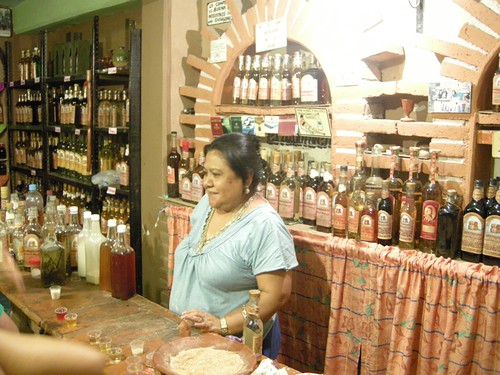
Going on a mezcal tasting was very high on my list of things to do in Oaxaca. I was introduced to mezcal last year at the San Francisco pizzeria
Beretta, when I told the bartender to make me whatever he desired. He mentioned a spirit from Mexico which was like tequila, but with notes of smokiness. He made me a fizz with it. It was love at first sip. And he wasn't kidding about the smokiness either. Whoa. Mezcal is made from the maguey plant, which is a subspecies of agave.
The similarities with tequila really ends there, as tequila is distilled with blue agave. More specifically, mezcal is made with the piña, or the heart, of the maguey (think anatomy of an artichoke). [UPDATE, 12/15/10, 5:05am EST: Inserting Paystyle's notes here, as he just schooled all of us on tequila vs. mezcal in the comments section]:
Technically speaking all tequilas are classified as mezcals, as mezcal is the overarching category of which tequila is a subcategory. Again, that’s the technical speak, though most people think of the smoky spirit when they think of mezcal, and for the purpose of avoiding confusion I do the same. Both tequilas and mezcals are made from the same part of the agave, the piña. The primary differences are the variety of agave used, the method of cooking the pina (baked in autoclaves which are often made of stainless steel vs. smoked underground for mezcal), and the region, with mezcal primarily coming from Oaxaca and Tequila primarily being produced in Jalisco. The regional differences are perhaps some of the most important when it comes to tequilas and mezcals because terroir is actually a huge factor in the final product. In this sense tequilas and mezcals bare the closes relation to scotch and cognac, which are usually the most terroir-driven spirits. It’s for this reason that so many wine and cognac geeks are getting into mezcal. While it's not as widely known here in the States as tequila, it deserves some serious recognition (Wiki says it is mostly exported to Japan and the US). Originating in Oaxaca, mezcal is a spirit known locally as the "elixir of the gods," according to Wiki. Oaxacans have been distilling it for at least 200 years (some say longer, like 400 years), taking the maguey plant (which takes seven years to mature!), extracting the piña, then roasting it in pits in the ground with hot stones, then covered in soil for three days. This is what gives mezcal its intense smoky flavor. They then mash up the smoked piña, and ferment it with some water. Jaime had heard about Pensamiento through a college friend of his. We took a day trip out to the Zapotec ruins
Mitla, and stopped in our way back-- about an hour out of Oaxaca City. Man, I wish you could have seen the landscape of Oaxaca out there-- it was a desert of agave plants for miles and miles! Mezcal distilleries dotted the main road here and there, but we held out for Pensamiento. The tasting room for Pensamiento is located on a bustling central street, Tlacolula (again, about an hour out of Oaxaca City). I do wish we would have visited the actual distillery, which was only a few miles away, but no matter. There's always next time, and this was such a fantastic, special introduction.
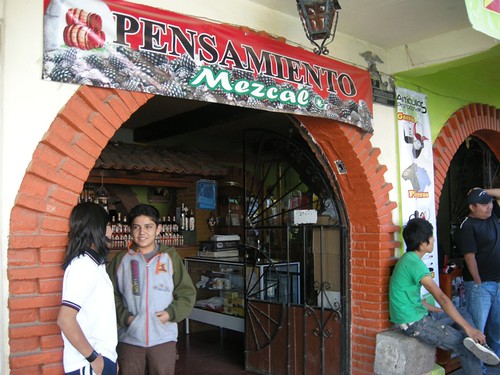
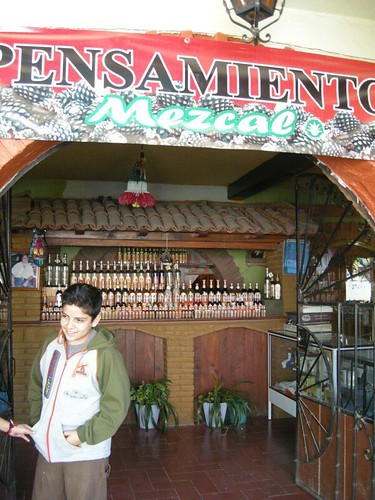
We walked through the front, and a younger gentleman led us through to the back. Where were they taking us?
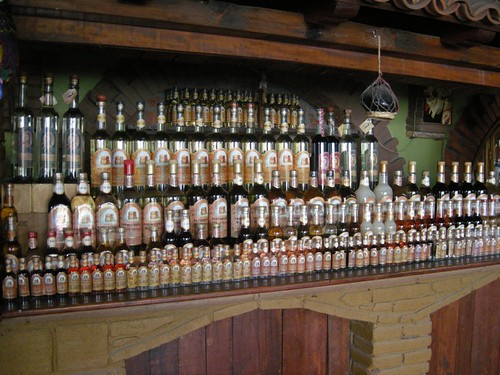
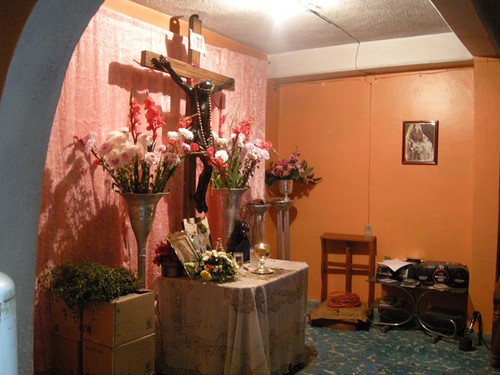
The back tasting room was like a cave, lit with bright lights and lined with wall after wall of mezcal.
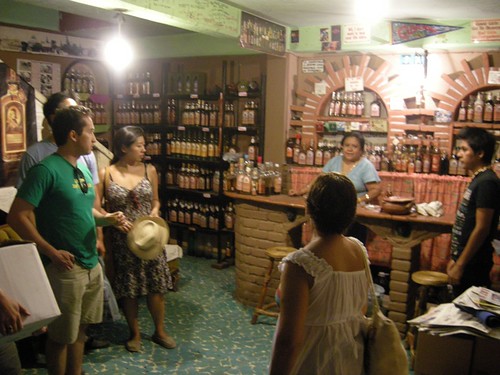
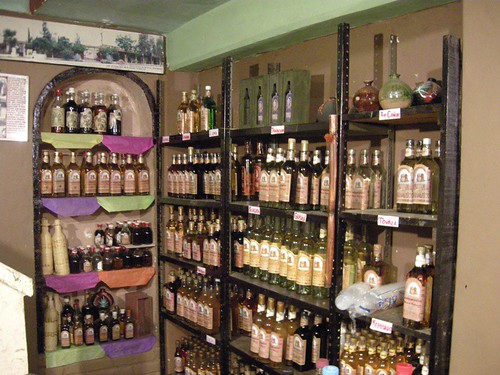
Don Gustavo Javier Pensamiento started the distillery 75 years ago, and the tasting room is run by his daughter, the vibrant Guadalupe aka Lupe. She was absolutely delightful-- ushered us in warmly, and started yelling at us to drink up right away. No one double crosses Lupe.

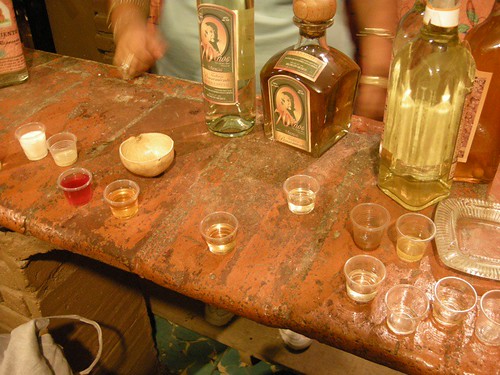
To me, mezcal tastes more like a peaty scotch, like Laphroig, than tequila. Don Pensamiento is known for pioneering "crema" which is fruit infused mezcal. It has is a bit sweeter, more floral, and surprisingly balances well with mezcal's characteristic smokiness. They had walls full of crema, from apple, orange, pear, to more tropical variations like pineapple, lychee (!) and passion fruit.
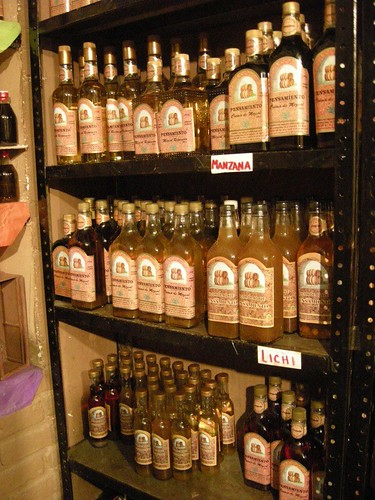
Wiki says that the common misconception is that tequila is distilled with worms, but really, it's mezcal that includes it. Here's some con "gusano". And biagra. I shall refrain.
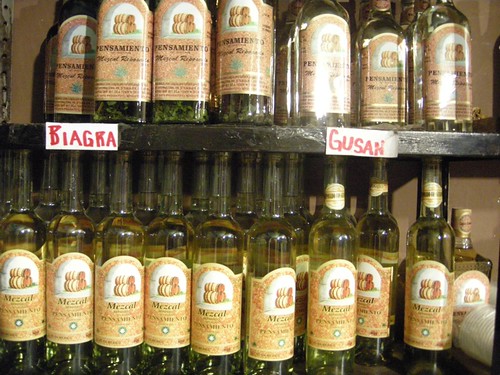
[UPDATE, 12/15/10, 5:05am EST: Paystyle's notes on the gusano]:
The whole worm in the bottle thing is a result of one brand’s marketing ploy way way back in the day to entice gullible Americans. I believe that brand is the Gusano Rojo brand, which happens to be shitty. It caught on so well that even reputable brands will tout this stuff to their visitors (as you personally experienced), to the point where even many Mexicans (primarily in the big cities) have come to believe in its authenticity. In fact there’s no authenticity nor legitimacy in the worm in the bottle notion. Some of the most well-respected and authentic brands, such as Del Maguey, disallow this, and hopefully this trend will too catch on. For the 70th anniversary of the distillery, Don Pensamiento came out with a line of premium mezcals, that have been aged for up to 16 years.
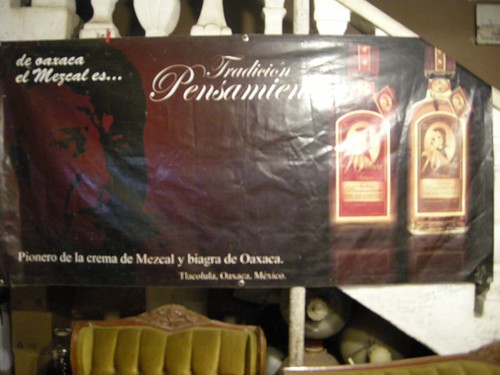
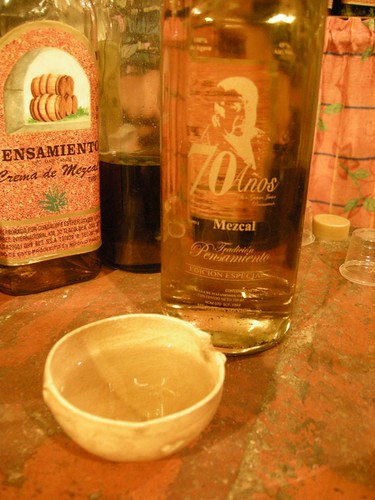
Lupe let us taste this by the cup full. Like some of the best whiskeys in the world, this is so smooth and layered. At this point, I was getting a little tipsy. Lupe is totally nuts (pun intended) and brought out this thing.
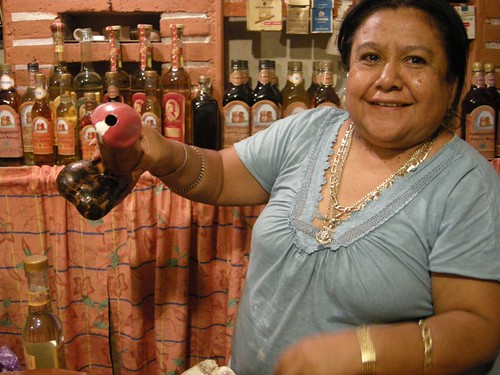
And then, things got wild, back in the cave.
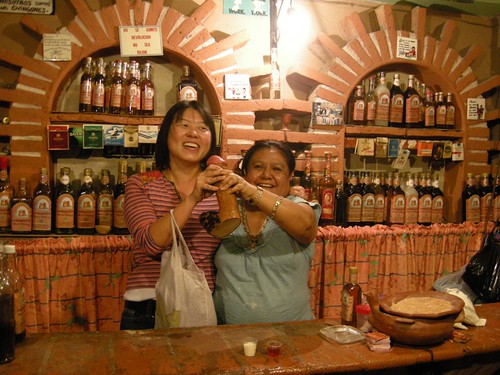
Never a dull moment with Lupe around. Love her.
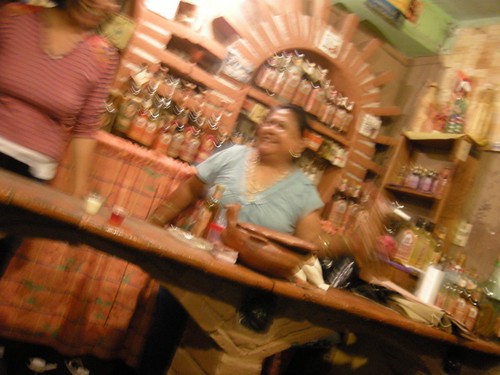
Lynchian.
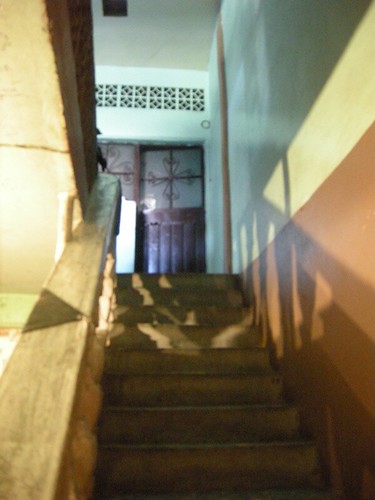
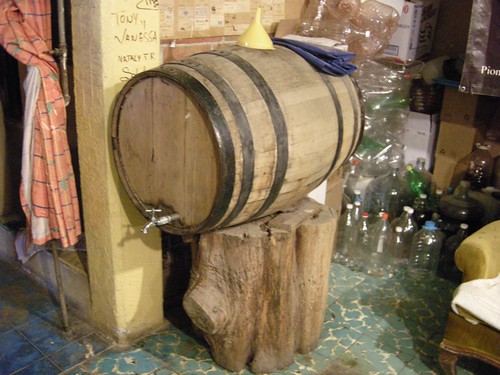
We all bought a bunch of bottles. My 16 year mezcal was about $40 (I bargained Lupe down, holla!).
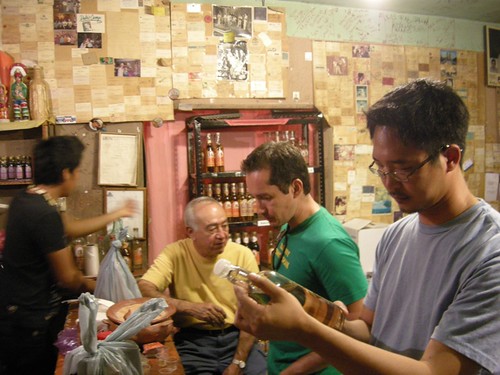
Thanks for such a fun time, and all the awesome mezcal, Lupe! Hope to meet your father at the distillery next time.
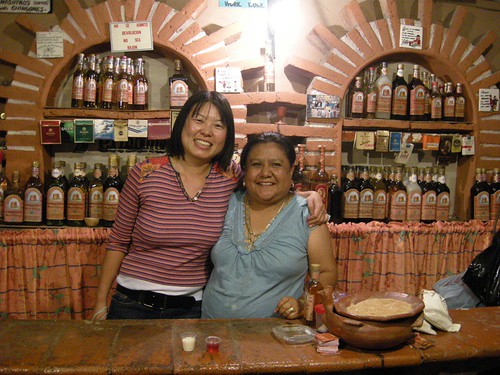
x
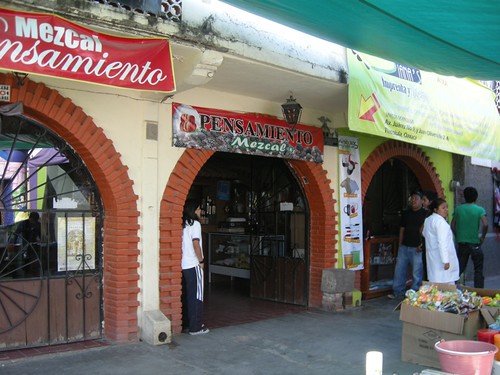
 Going on a mezcal tasting was very high on my list of things to do in Oaxaca. I was introduced to mezcal last year at the San Francisco pizzeria Beretta, when I told the bartender to make me whatever he desired. He mentioned a spirit from Mexico which was like tequila, but with notes of smokiness. He made me a fizz with it. It was love at first sip. And he wasn't kidding about the smokiness either. Whoa. Mezcal is made from the maguey plant, which is a subspecies of agave. The similarities with tequila really ends there, as tequila is distilled with blue agave. More specifically, mezcal is made with the piña, or the heart, of the maguey (think anatomy of an artichoke). [UPDATE, 12/15/10, 5:05am EST: Inserting Paystyle's notes here, as he just schooled all of us on tequila vs. mezcal in the comments section]: Technically speaking all tequilas are classified as mezcals, as mezcal is the overarching category of which tequila is a subcategory. Again, that’s the technical speak, though most people think of the smoky spirit when they think of mezcal, and for the purpose of avoiding confusion I do the same. Both tequilas and mezcals are made from the same part of the agave, the piña. The primary differences are the variety of agave used, the method of cooking the pina (baked in autoclaves which are often made of stainless steel vs. smoked underground for mezcal), and the region, with mezcal primarily coming from Oaxaca and Tequila primarily being produced in Jalisco. The regional differences are perhaps some of the most important when it comes to tequilas and mezcals because terroir is actually a huge factor in the final product. In this sense tequilas and mezcals bare the closes relation to scotch and cognac, which are usually the most terroir-driven spirits. It’s for this reason that so many wine and cognac geeks are getting into mezcal. While it's not as widely known here in the States as tequila, it deserves some serious recognition (Wiki says it is mostly exported to Japan and the US). Originating in Oaxaca, mezcal is a spirit known locally as the "elixir of the gods," according to Wiki. Oaxacans have been distilling it for at least 200 years (some say longer, like 400 years), taking the maguey plant (which takes seven years to mature!), extracting the piña, then roasting it in pits in the ground with hot stones, then covered in soil for three days. This is what gives mezcal its intense smoky flavor. They then mash up the smoked piña, and ferment it with some water. Jaime had heard about Pensamiento through a college friend of his. We took a day trip out to the Zapotec ruins Mitla, and stopped in our way back-- about an hour out of Oaxaca City. Man, I wish you could have seen the landscape of Oaxaca out there-- it was a desert of agave plants for miles and miles! Mezcal distilleries dotted the main road here and there, but we held out for Pensamiento. The tasting room for Pensamiento is located on a bustling central street, Tlacolula (again, about an hour out of Oaxaca City). I do wish we would have visited the actual distillery, which was only a few miles away, but no matter. There's always next time, and this was such a fantastic, special introduction.
Going on a mezcal tasting was very high on my list of things to do in Oaxaca. I was introduced to mezcal last year at the San Francisco pizzeria Beretta, when I told the bartender to make me whatever he desired. He mentioned a spirit from Mexico which was like tequila, but with notes of smokiness. He made me a fizz with it. It was love at first sip. And he wasn't kidding about the smokiness either. Whoa. Mezcal is made from the maguey plant, which is a subspecies of agave. The similarities with tequila really ends there, as tequila is distilled with blue agave. More specifically, mezcal is made with the piña, or the heart, of the maguey (think anatomy of an artichoke). [UPDATE, 12/15/10, 5:05am EST: Inserting Paystyle's notes here, as he just schooled all of us on tequila vs. mezcal in the comments section]: Technically speaking all tequilas are classified as mezcals, as mezcal is the overarching category of which tequila is a subcategory. Again, that’s the technical speak, though most people think of the smoky spirit when they think of mezcal, and for the purpose of avoiding confusion I do the same. Both tequilas and mezcals are made from the same part of the agave, the piña. The primary differences are the variety of agave used, the method of cooking the pina (baked in autoclaves which are often made of stainless steel vs. smoked underground for mezcal), and the region, with mezcal primarily coming from Oaxaca and Tequila primarily being produced in Jalisco. The regional differences are perhaps some of the most important when it comes to tequilas and mezcals because terroir is actually a huge factor in the final product. In this sense tequilas and mezcals bare the closes relation to scotch and cognac, which are usually the most terroir-driven spirits. It’s for this reason that so many wine and cognac geeks are getting into mezcal. While it's not as widely known here in the States as tequila, it deserves some serious recognition (Wiki says it is mostly exported to Japan and the US). Originating in Oaxaca, mezcal is a spirit known locally as the "elixir of the gods," according to Wiki. Oaxacans have been distilling it for at least 200 years (some say longer, like 400 years), taking the maguey plant (which takes seven years to mature!), extracting the piña, then roasting it in pits in the ground with hot stones, then covered in soil for three days. This is what gives mezcal its intense smoky flavor. They then mash up the smoked piña, and ferment it with some water. Jaime had heard about Pensamiento through a college friend of his. We took a day trip out to the Zapotec ruins Mitla, and stopped in our way back-- about an hour out of Oaxaca City. Man, I wish you could have seen the landscape of Oaxaca out there-- it was a desert of agave plants for miles and miles! Mezcal distilleries dotted the main road here and there, but we held out for Pensamiento. The tasting room for Pensamiento is located on a bustling central street, Tlacolula (again, about an hour out of Oaxaca City). I do wish we would have visited the actual distillery, which was only a few miles away, but no matter. There's always next time, and this was such a fantastic, special introduction. 
 We walked through the front, and a younger gentleman led us through to the back. Where were they taking us?
We walked through the front, and a younger gentleman led us through to the back. Where were they taking us? 
 The back tasting room was like a cave, lit with bright lights and lined with wall after wall of mezcal.
The back tasting room was like a cave, lit with bright lights and lined with wall after wall of mezcal. 
 Don Gustavo Javier Pensamiento started the distillery 75 years ago, and the tasting room is run by his daughter, the vibrant Guadalupe aka Lupe. She was absolutely delightful-- ushered us in warmly, and started yelling at us to drink up right away. No one double crosses Lupe.
Don Gustavo Javier Pensamiento started the distillery 75 years ago, and the tasting room is run by his daughter, the vibrant Guadalupe aka Lupe. She was absolutely delightful-- ushered us in warmly, and started yelling at us to drink up right away. No one double crosses Lupe. 
 To me, mezcal tastes more like a peaty scotch, like Laphroig, than tequila. Don Pensamiento is known for pioneering "crema" which is fruit infused mezcal. It has is a bit sweeter, more floral, and surprisingly balances well with mezcal's characteristic smokiness. They had walls full of crema, from apple, orange, pear, to more tropical variations like pineapple, lychee (!) and passion fruit.
To me, mezcal tastes more like a peaty scotch, like Laphroig, than tequila. Don Pensamiento is known for pioneering "crema" which is fruit infused mezcal. It has is a bit sweeter, more floral, and surprisingly balances well with mezcal's characteristic smokiness. They had walls full of crema, from apple, orange, pear, to more tropical variations like pineapple, lychee (!) and passion fruit.  Wiki says that the common misconception is that tequila is distilled with worms, but really, it's mezcal that includes it. Here's some con "gusano". And biagra. I shall refrain.
Wiki says that the common misconception is that tequila is distilled with worms, but really, it's mezcal that includes it. Here's some con "gusano". And biagra. I shall refrain.  [UPDATE, 12/15/10, 5:05am EST: Paystyle's notes on the gusano]: The whole worm in the bottle thing is a result of one brand’s marketing ploy way way back in the day to entice gullible Americans. I believe that brand is the Gusano Rojo brand, which happens to be shitty. It caught on so well that even reputable brands will tout this stuff to their visitors (as you personally experienced), to the point where even many Mexicans (primarily in the big cities) have come to believe in its authenticity. In fact there’s no authenticity nor legitimacy in the worm in the bottle notion. Some of the most well-respected and authentic brands, such as Del Maguey, disallow this, and hopefully this trend will too catch on. For the 70th anniversary of the distillery, Don Pensamiento came out with a line of premium mezcals, that have been aged for up to 16 years.
[UPDATE, 12/15/10, 5:05am EST: Paystyle's notes on the gusano]: The whole worm in the bottle thing is a result of one brand’s marketing ploy way way back in the day to entice gullible Americans. I believe that brand is the Gusano Rojo brand, which happens to be shitty. It caught on so well that even reputable brands will tout this stuff to their visitors (as you personally experienced), to the point where even many Mexicans (primarily in the big cities) have come to believe in its authenticity. In fact there’s no authenticity nor legitimacy in the worm in the bottle notion. Some of the most well-respected and authentic brands, such as Del Maguey, disallow this, and hopefully this trend will too catch on. For the 70th anniversary of the distillery, Don Pensamiento came out with a line of premium mezcals, that have been aged for up to 16 years. 
 Lupe let us taste this by the cup full. Like some of the best whiskeys in the world, this is so smooth and layered. At this point, I was getting a little tipsy. Lupe is totally nuts (pun intended) and brought out this thing.
Lupe let us taste this by the cup full. Like some of the best whiskeys in the world, this is so smooth and layered. At this point, I was getting a little tipsy. Lupe is totally nuts (pun intended) and brought out this thing.  And then, things got wild, back in the cave.
And then, things got wild, back in the cave.  Never a dull moment with Lupe around. Love her.
Never a dull moment with Lupe around. Love her.  Lynchian.
Lynchian. 
 We all bought a bunch of bottles. My 16 year mezcal was about $40 (I bargained Lupe down, holla!).
We all bought a bunch of bottles. My 16 year mezcal was about $40 (I bargained Lupe down, holla!).  Thanks for such a fun time, and all the awesome mezcal, Lupe! Hope to meet your father at the distillery next time.
Thanks for such a fun time, and all the awesome mezcal, Lupe! Hope to meet your father at the distillery next time.  x
x 



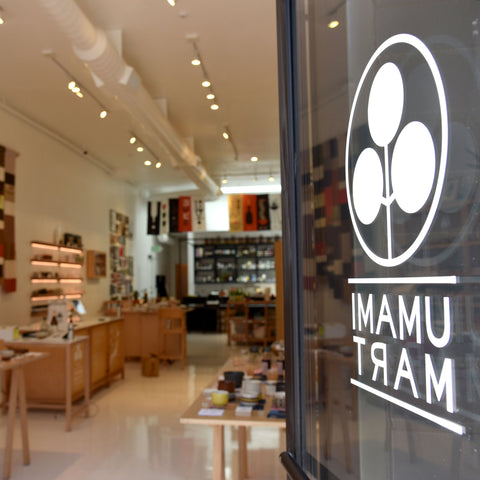
Comments (10)
Biagra and a dildo? No wonder both Lupe and you look so happy in these pics.
i hate you.
Is it a cup? Are you supposed to drink from the dildo? And did it bring you magic dildo powers?
You should’ve bought a whole box and sold them in the Umamimart Shop.
whole box of dildo shaped cup, or mezcal, or biagra?
Thank you Anders for your inquisitive, observational comment.
Yes, it is a drinking vessel.
Omg I’m gonna stop now.
Man that sounds like an excellent experience, and an awesome post! Oaxaca is tops on my list of places to visit.
I do have to issue a couple of clarifications that are often misunderstood about mezcal. For one, technically speaking all tequilas are classified as mezcals, as mezcal is the overarching category of which tequila is a subcategory. Again, that’s the technical speak, though most people think of the smoky spirit when they think of mezcal, and for the purpose of avoiding confusion I do the same.
Second, both tequilas and mezcals are made from the same part of the agave, the pina. The primary differences are the variety of agave used, the method of cooking the pina (baked in autoclaves which are often made of stainless steel vs. smoked underground for mezcal), and the region, with mezcal primarily coming from Oaxaca and Tequila primarily being produced in Jalisco.
The regional differences are perhaps some of the most important when it comes to tequilas and mezcals because terroir is actually a huge factor in the final product. In this sense tequilas and mezcals bare the closes relation to scotch and cognac, which are usually the most terroir-driven spirits. It’s for this reason that so many wine and cognac geeks are getting into mezcal.
Lastly, the whole worm in the bottle thing is a result of one brand’s marketing ploy way way back in the day to entice gullible Americans. I believe that brand is the Gusano Rojo brand, which happens to be shitty. It caught on so well that even reputable brands will tout this stuff to their visitors (as you personally experienced), to the point where even many Mexicans (primarily in the big cities) have come to believe in its authenticity.
In fact there’s no authenticity nor legitimacy in the worm in the bottle notion. Some of the most well-respected and authentic brands, such as Del Maguey, disallow this, and hopefully this trend will too catch on.
While the worm is not included in good mescals, they do use a salt and ground worm mixture as a pre-drink lick, just like having salt before a tequila shot
Great post, love the pictures. Lupe is my kind of gal :) From now on I will only drink my liquor from dildos.
Now, why on earth would I research on wikipedia when we’ve got an in-house spirits expert?? Shame on me! Lesson learned.
Thanks for your awesome knowledge Pay! I’ve incorporated your notes into the post.
I’ve been to Oaxaca three times, in the past three years. And while Pensamiento is an acceptable distillery, it’s not a great distillery. Try Real Minero next time, and, for great mezcal bars in Oaxaca City, go to Los Amantes (Allende #107) and Mezcaloteca (check out http://www.mezcaloteca.com). Salud!